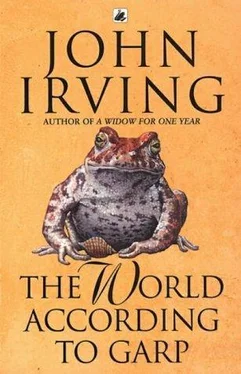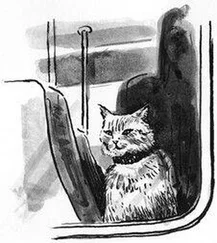Helen would remark bitterly, but only once, that Garp's death was really a kind of suicide, after all. “In the sense that his whole life was a suicide,” she said, mysteriously. She would later explain that all she meant was, “He made people too angry.”
He had made Pooh Percy too angry; at least that was clear.
He made others pay him tribute, small and strange. The Steering School cemetery got the honor of his gravestone, if not his body; like his mother's, Garp's body went to medicine. The Steering School also chose to honor him by naming after him its one remaining building that was not named after anybody else. It was old Dean Bodger's idea. If there was a Jenny Fields Infirmary, the good dean argued, then there should be a Garp Infirmary Annex.
In later years the functions of these buildings would alter slightly, although they would remain, in name, the Fields Infirmary and the Garp Annex. The Fields Infirmary would one day become the old wing of the new Steering Health Clinic and Laboratories; the Garp Annex would become a building used chiefly for storage—a kind of warehouse for medical, kitchen and classroom supplies; it could also be used for epidemics. Of course, there weren't many epidemics anymore. Garp probably would have liked the idea: to have a storage building named after him. He wrote once that a novel was “only a place for storage—of all the meaningful thing's that a novelist isn't able to use in his life.”
He would have liked the idea of an epilogue, too—so here it is: an epilogue “warning us about the future,” as T. S. Garp might have imagined it.
ALICE and HARRISON FLETCHER would remain married, through thick and through thin—in part, their marriage lasted because of Alice's difficulty with finishing anything. Their only child, a daughter, would play the cello—that large and cumbersome and silken-voiced instrument—in a manner so graceful that the pure, deep sound of it aggravated Alice's speech defect for hours after each performance. Harrison, who would get and hold his tenure after a while, would outgrow his habits with his prettier students about the time his talented daughter began to assert herself as a serious musician.
Alice, who would never complete her second novel, or her third or fourth, would never have a second child, either. She remained smoothly fluent on the page, and agonizing in the flesh. Alice never again took to “other men” to the degree that she had taken to Garp; even in her memory, he was a passion that was strong enough to keep her from ever becoming close to Helen. And Harry's old fondness for Helen seemed to fade with each of his fast-fading affairs, until the Fletchers rarely kept track of the surviving Garps at all.
Once Duncan Garp met the Fletcher daughter in New York, after her maiden cello solo in that dangerous city; Duncan took her to dinner.
“Does he look like his mother?” Harrison asked the girl.
“I don't remember her very well,” the daughter said.
“Did he make a path at you?” Alice asked.
“I don't think so,” said her daughter, whose first-chosen and best-loved partner would always be that big-hipped cello.
The Fletchers, both Harry and Alice, would die in their ripe middle age, when their airplane—to Martinique—crashed during the Christmas holidays. One of Harrison's students had driven them to the airport.
“If you live in New England,” Alice confided to the student, “you owe yourthelf a holiday in the thun . Right, Harrithon?”
Helen had always thought that Alice was “a little loony.”
HELEN HOLM, who most of her life would be known as Helen Garp, would live a long, long time. A slim, dark woman with an arresting face and precise language, she would have her lovers but never remarry. Each lover suffered the presence of Garp—not only in Helen's relentless memory, but in the articles of fact that Helen surrounded herself with in the Steering mansion, which she rarely left: for example, Garp's books, and all of Duncan's photographs of him, and even Garp's wrestling trophies.
Helen maintained that she could never forgive Garp for dying so young and leaving her to live so much of her life alone—he had also spoiled her, she claimed, for ever considering seriously the possibility of living with another man.
Helen would become one of the most respected teachers the Steering School ever had, though she would never lose her sense of sarcasm about the place. She had some friends there, though they were few: old Dean Bodger, until he died, and the young scholar, Donald Whitcomb, who would become as enchanted with Helen as he was enchanted with the work of Garp. There was also a woman, a sculptor, who was an artist-in-residence—someone Roberta had introduced Helen to.
John Wolf was a lifelong friend whom Helen forgave in small pieces, but never completely, for his success at making Garp a success. Helen and Roberta remained close, too—Helen occasionally joining Roberta for Roberta's famous flings upon the city of New York. The two of them, growing older and more eccentric, were guilty of lording it over the Fields Foundation for years. In fact, the wit of their running commentary on the outside world became almost a tourist attraction at Dog's Head Harbor; from time to time, when Helen was lonely or bored at Steering—when her children were grown up and pursuing their own lives, elsewhere—she went to stay with Roberta at Jenny Fields' old estate. It was always lively there. When Roberta died, Helen appeared to age twenty years.
Very late in her life—and only after she had complained to Duncan that she had survived all her favorite contemporaries—Helen Holm was stricken suddenly with an illness that affects the body's mucous membranes. She would die in her sleep.
She had successfully outlived many cutthroat biographers who were waiting for her to die so that they could swoop in on the remains of Garp. She had protected his letters, the unfinished manuscript of My Father's Illusions , most of his journals and jottings. She told all the would-be biographers, exactly as he would have, “Read the work. Forget the life.”
She herself wrote several articles, which were respected in her field. One was called “The Adventurer's Instinct in Narration.” It was a comparative study of the narrative technique of Joseph Conrad and Virginia Woolf.
Helen always considered herself as a widow left with three children—Duncan, baby Jenny, and Ellen James, who all survived Helen and wept copiously at her death. They had been too young and too astonished to weep as much for Garp.
DEAN BODGER, who wept almost as much as Helen at Garp's death, remained as loyal as a pit bull, and as tenacious. Long after his retirement, he still stormed the Steering campus by night, unable to sleep, fitfully capturing lurkers and lovers who slunk along the footpaths and hugged each other to the spongy ground—under the soft bushes, alongside the beautiful old buildings, and so forth.
Bodger remained active at Steering for as long as it took Duncan Garp to graduate. “I saw your father through, boy,” the dean told Duncan. “I'll see you through, too. And if they let me, I'll stay to see your sister through.” But they finally forced his retirement; they cited to themselves, among other problems, his habit of talking to himself during chapel, and his bizarre arrests, at midnight, of the boys and girls caught out after hours. They also mentioned the dean's recurring fantasy: that it had been the young Garp he caught in his arms—one night, years ago—and not a pigeon. Bodger refused to move from the campus, even when he was retired, and despite—or, perhaps, because of—his obstinacy, he became Steering's most honored emeritus. They would drag him out for all the school's ceremonies; they would totter him up to the stage, introduce him to people who didn't know who he was, and then they would lead him away. Perhaps because they could display him on these dignified occasions, they tolerated his odd behavior; long through his seventies, for example, Bodger would be convinced—sometimes for weeks at a time—that he was still the dean.
Читать дальше












